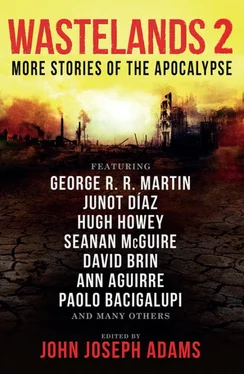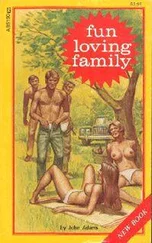Why should they not rule it? We were only relics ourselves, we who had had the misfortune of surviving the plague. Out of every hundred thousand, only fifty or a hundred had survived. And as we scavenged in the ruins, as we bulldozed earth over the corpses we dragged from the areas where we meant to live, as we struggled to learn how to keep a generator or two running, a truck here and there, the radios we used only once a week, then once a month, then once a year, we gradually came to realize that there would be no more children. No one conceived. No one bore. The disease had sterilized us, almost all. There would be no recovery from this plague. Our extinction had not required a celestial missile to shatter the earth and darken the sky for a year; no other species shared our doom with us. We had been taken out surgically, precisely, thoroughly, a tumor removed with a delicate viral hand.
So we did not begrudge the elephants their possession of the fields and the forests. The males could knock down trees to show their strength; there was no owner to demand that animal control officers come and dispose of the rampaging beasts. The females could gather their children into barns and stables against the winter blast, and no owner would evict them; only the crumbling bones and strands of hairy flesh showed where horses and cattle had starved to death when their masters died too quickly to think of setting them free from their stalls and pens.
Why, though, had these males come into the city? There was nothing for them to eat. There was nothing for us to eat; when our bicycles gave out and we could cobble together no more makeshift carts, we would have to leave the city ourselves and live closer to the food that we gathered from untended fields. Why would the elephants bother with such a ruin? Curiosity, perhaps. Soon they would see that there was nothing here for them, and move on.
We found ourselves growing impatient as the hours passed, and the days, and still we kept encountering them on the city streets. Didn’t they understand that we lived in the heart of Poznan specifically because we wanted a human place? Didn’t they feel our resentment of their trespass? All the rest of Earth is yours; can you not leave undesecrated these crypts we built for ourselves in the days of our glory?
Gradually it dawned on us—dawned on me, actually, but the others realized I was right—that the elephants had come, not to explore Poznan, but to observe us. I would pedal my bicycle and glance down a cross street to see an elephant lumbering along on a parallel path; I would turn, and see him behind me, and feel that shuddering in my breastbone, in my forehead, that told me they were speaking to each other, and soon another elephant would be shadowing me, seeing where I went, watching what I did, following me home.
Why were they interested in us? Humans were no longer killing them for their ivory. The world was theirs. We were going to die—I, who was only seven years old when the plague came, am now past thirty, and many of the older survivors are already, if not at death’s door, then studying the travel brochures and making reservations, their Bibles open and their rosaries in hand. Were these males here as scientists, to watch the last of the humans, to study our death ways, to record the moment of our extinction so that the elephants would remember how we died with only a whimper, or less than that, a whisper, a sigh, a sidelong glance at God?
I had to know. For myself, for my own satisfaction. If I found the truth, whom else would I tell it to, and for what purpose? They would only die as I would die, taking memory with them into the fire, into the ash, into the dust. I couldn’t get any of the others to care about the questions that preyed upon me. What do the elephants want from us? Why do they follow us?
Leave it alone, Lukasz, they said to me. Isn’t it enough that they don’t bother us?
And I answered with the most perplexing question of all, to me at least. Why elephants? The other wild animals that roamed the open country were the ones one might expect to see: The packs of dogs gone wild, interbreeding back to mongrel wolfhood; the herds of cattle, breeding back to hardiness, and of horses, quick and free and uninterested in being tamed. The companions of man, the servants and slaves of man, now masterless, now free. Unshorn sheep. Unmilked goats. Sudden-leaping housecats. Scrawny wild chickens hiding from ever-vigilant hawks. Ill-tempered pigs rooting in the woods, the boars making short work of dogs that grew too bold. That was the wildlife of Europe. No other animals from Africa had made the journey north. Only the elephants, and not just from Africa—the elephants of India were roaming the Orient, and on the most recent Radio Day we learned, through messages relayed many times, that they had somehow crossed the Bering Strait and were now, in ever greater numbers, grazing the prairies of America, small-eared cousins to the great-canopied beasts that now shadowed us on the streets of Poznan. I pictured them swimming, or piling onto boats that some last human pilot guided for them onto the Stygian shore.
They had inherited the Earth, and were bent on surveying their new domain.
So I took to spending my days in the library, reading all I could about elephants, and then about all the processes of life, all the passages of history, trying to understand not only them but ourselves, and what had happened to us, and what our cities might mean to them, our houses, our streets, our rusting cars, our collapsing bridges, our sorry cemetery mounds where winter brought fresh crops of human bone to the surface, white stubble on a fallow field. I write this now because I think I know the answers, or at least have found guesses that ring true to me, though I also know they might be nothing more than a man hungry for meanings inventing them where they don’t exist. Arguably, all meanings are invented anyway; and since I have no one to please but myself, and no one to read this who will care, except perhaps one, then I may write as I please, and think as I please, and reread this whenever I can bear it.
They made no effort to follow me inside the library. What good would it do them? Clever as they were with their inquisitive trunks, I could imagine them being deft enough to turn pages without tearing them. But what would the markings on the pages mean to them? Elephants sang their literature to each other in octaves we humans could not hear. Their science was the science of the temporal gland, the probing nose. They observed, but—or so I thought—did not experiment.
I did learn enough to warn the others before the first of the males went into musth. When you see one of them acting agitated, when his temporal glands pour out a steady black streak down his cheeks, when the other males are shy of him and give him room, then we must do the same, staying out of his way, not meeting his gaze. Let him pass. The city is his, wherever he wants to go. He won’t stay here long, in musth. He must go and find a female then, and they were all outside in the open fields. He would give his deep rumbling call and pour out his lusty scent into the air and dribble musky fluid onto the ground where every other elephant could smell it and know: This way passed a male bent on making babies. This way passed God, looking for the Holy Virgin.
So we studied each other, and avoided offending each other, and grew used to each other’s ways, the elephants and the fifty remaining residents of Poznan.
And then one day they began to push.
The males all gathered in the public square. We, too, gossiping to each other that something important was going to happen, gathered in our houses and leaned at our windows to watch.
They wandered aimlessly through the square, eleven of them—the twelve apostles, I thought, sans Iscariot—until noon made the smallest shadows. Then, as if of one mind, they surrounded the ugly old Communist building, facing it. When all were in place, they moved forward, slowly, each bull resting his massive brow against the miserable façade. Then, slowly, each began to tense his muscles, to shift his weight, to make little adjustments, to plant his feet, and then to push with greater and greater strength against the wall.
Читать дальше












